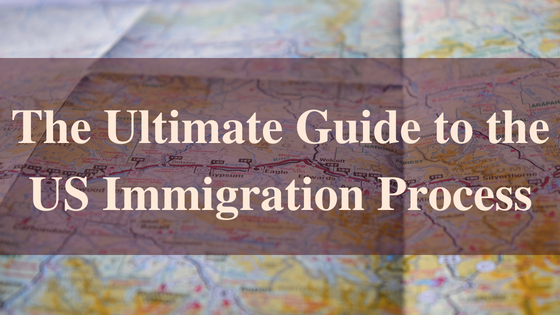
The Ultimate Guide to the U.S. Immigration Process
The process for applying for a U.S. immigration visa, a green card, or naturalized citizenship can seem very complicated – but this ultimate guide to the U.S. immigration process will get you started with the information you need to start down your own path.
Visas
While the State Department issues temporary visas regularly for study, work or business, and a variety of other categories, some U.S. immigration visas are intended to serve as a pathway to permanent residency and citizenship.
In the majority of cases, a U.S. immigration visa is based on family relationships or employment-related situations. In both of these circumstances, the foreign citizen must have a close relative or a prospective employer sponsor them and initiate the application process.
There are several visa categories, including nonimmigrant and immigrant types.
Nonimmigrant Visas for Visiting the U.S.
Nonimmigrant visas are typically reserved for study or temporary work and include categories such as:
- Business visitors
- Cultural exchange visitors
- Diplomats
- Foreign military personnel
- Foreign nationals with extraordinary ability
- Performing athletes, artists or entertainers
- Physicians
- Specialty occupations in fields that require highly specialized knowledge
- Students
- Temporary agricultural workers
- Tourism
- Transitional workers
This isn’t a complete list. There are several other types of nonimmigrant visas people can use to enter the United States for a set period of time, as well – and your immigration attorney can help you determine what best applies to your situation.
Immigrant Visas for Eventually Becoming a U.S. Resident or Citizen
Immigrant visas are generally related to family relationships and employment opportunities. Some of the most common immigrant visas people use include:
- Immediate relative visas that include spouses, fiancés, children and adopted children of U.S. citizens
- Immediate relative visas that include spouses, fiancés, children and adopted children of green card holders
- Employer-sponsored visas
- Religious workers
- Iraqi and Afghan translators and interpreters, as well as Iraqis and Afghans who worked for or on behalf of the U.S. government in other capacities
- Diversity immigrant visas
- Returning resident visas
Sponsor Qualifications for a Family-Based U.S. Immigration Visa
The United States Department of State offers two groups of family-based immigration visas. These are:
- Immediate relative visas. Immediate relative, or IR, visas are unlimited and are intended to reunite immediate family members including a spouse, unmarried children under 21 years of age, orphans adopted (in the U.S. or elsewhere) by U.S. citizens, or parents of a U.S. citizen.
- Family preference U.S. immigration visas. Family preference visas are limited in number and apply in many instances to lawful permanent residents, as well. Each year numerical limits are placed on these categories, so granting a visa for immigration is not automatic.
- This category is prioritized into degrees of preference to determine who has priority. The degrees are:
• First preference. First preference, or F1, goes to unmarried children of U.S. citizens.
• Second preference. Second preference, or F2, is for spouses and children of lawful permanent residents.
• Third preference. Third preference, or F3, goes to married sons and daughters of U.S. citizens, their spouses and their children.
• Fourth preference. Fourth preference, or F4, is reserved for brothers and sisters of U.S. citizens and their minor children, provided that the U.S. citizen is at least 21 years old.
Grandparents, aunts, uncles, cousins or in-laws are not allowed to sponsor a family-based immigration visa.
Numerical Limitations and Priority Date
In cases where a limit is in place for a specific category of immigrant candidates, applications will be considered in the chronological order in which the sponsor applied. When the applicant’s number is reached, a “priority date” is established which allows the candidate to apply for the immigration visa.
The 5 Steps to Apply for a U.S. Immigration Visa
- The sponsor, whether a relative or employer, must apply to the United States Citizenship and Immigration Service, or USCIS, which is a division of Homeland Security. The sponsor completes a Petition for Alien Relative Form I-130.
The sponsor must be 21 years of age and a resident of the United States to complete and sign the form. However, a resident U.S. citizen can be at least 18 years of age to file an Affidavit of Support, I-864.
To ensure accuracy and adequate documentation, the sponsor should consult with an experienced U.S. immigration visa lawyer to advise and assist with the many technicalities. Errors cause delays and sometimes refusal, while appropriately completed forms have a better chance of success.
If the sponsor filed for a U.S. immigration visa as a Lawful Permanent Resident (LPR), but in the meantime became a U.S. citizen, the status of that application is upgraded from Preference to Immediate Relative status.
The State Department provides more information regarding unique immigration visa situations. However, consultation with an experienced immigration law firm can be a valuable resource for helping you understand and navigate the complex requirements. - If the USCIS approves the initial Petition for Alien Relative, the documents are sent to the National Visa Center, or NVC, where a number is assigned. The applicant will then be asked to complete a Form DS-261, Choice of Address and Agent. Here again, an experienced U.S. immigration visa attorney can be valuable to ensure that all documents are appropriately gathered and presented. These may include the Affidavit of Support, civil records, and application forms. At this point, the applicant will be asked to pay visa application fees.
- The applicant must undergo a Visa Interview at the appropriate U.S. Embassy or Consulate. The individual will be notified in advance of the interview and will be asked to bring specific documentation for the discussion. Attempting to mislead interviewers can result in rejection for immigration.
- Physical examination and vaccinations must be performed.
- The applicant receives the U.S. immigration visa and is permitted to enter the United States on a permanent status.
Permanent Residency With a Green Card
Not everyone is eligible to apply for permanent residency in the U.S. However, you could be eligible for a green card through family connections, your employer, or through refugee or asylee status. You may also be eligible as a special immigrant, a human trafficking or crime victim, victim of abuse, or through other categories.
Green Cards for Family Members of U.S. Citizens or Green Card Holders
Generally, you may be eligible to apply for a green card sponsorship based on your family connections with a U.S. citizen or green card holder. In most cases, you must be a:
- Spouse
- Child of a U.S. citizen
- Parent of a U.S. citizen who is at least 21 years old
- Brother or sister of a U.S. citizen who is at least 21 years old
- The fiancé of a U.S. citizen
- Widow or widower of a U.S. citizen
Green Cards Through Employment
You may apply for a green card if you’re working in the U.S. permanently, or if you’re a physician or an immigrant investor. Immigrant workers are categorized through a preference system that works like this:
- First preference is given to those who have extraordinary ability in science, art, education, business or athletics, or those who are recognized as outstanding professors or researchers. It’s also given to multinational managers or executives who meet certain criteria.
- Second preference is given to people who are members of professions that require advanced degrees or who have exceptional ability in the sciences, arts or business. It’s also given to people who are seeking a national interest waiver.
- Third preference goes to people who are skilled workers in fields that require a minimum of 2 years or training or work experience, professionals who work in jobs that require at least a bachelor’s degree or its foreign equivalent, or an unskilled worker.
Special Immigrant Green Cards
You could qualify for a green card as a special immigrant if you are:
- A religious worker who is coming to the U.S. to work for a nonprofit religious organization
- A special immigrant juvenile who has been abused, abandoned or neglected by your parent and you have SIJ status
- An Afghanistan or Iraq national who served as a translator. You may also apply if you were an Iraqi employed by or for the U.S. government on or after March 20, 2003, or if you were an Afghan employed by the International Security Assistance Force
- An international broadcaster who’s coming to the U.S. as a member of the media
Other Types of Green Card Eligibility
Refugees and asylees who were admitted into the U.S. at least one year prior to making a green card application are eligible to apply. So are:
- Human trafficking victims who currently possess a T nonimmigrant visa
- Crime victims who currently possess a U nonimmigrant visa
- The victim of battery or extreme cruelty if you’re a spouse, child or parent of a U.S. citizen or lawful permanent resident
- There are other types of green cards available, as well, that include those who are in very specific categories, such as people who:
- Were selected for a diversity visa
- Fall under the Cuban Adjustment Act
- Are considered dependents under the Haitian Refugee Immigration Fairness Act, or HRIFA
- Were paroled into the U.S. as Lautenberg parolees
- Are part of the Indochinese Parole Adjustment Act of 2000
- Are American Indians born in Canada
- Were born in the U.S. to a foreign diplomat
- Were stationed in the U.S. as a foreign diplomat or other high-ranking official but are unable to return home
Naturalized Citizenship in the U.S.
If you have a green card, you may eventually be eligible for naturalized citizenship in the U.S. Typically, you must follow a very rigid procedure – and your immigration attorney can help you every step of the way.
Steps to Becoming a Naturalized Citizen of the U.S.
If you’re eligible, these are the steps you must take to become a naturalized citizen of the U.S.:
- Prepare a Form N-400, Application for Naturalization. You can download the form online.
- Gather the required documentation that prove you’re eligible for naturalization and submit your form. Make copies of everything – don’t submit your originals.
- Find out if you need to go to a biometrics appointment. Not everyone does, but if you do, make sure you arrive on time to have your biometrics taken.
- Complete an interview with USCIS. At your interview, you’ll have to answer questions about your background; you’ll also have to take an English test and a civics test. You must answer at least six of the ten questions on your civics test correctly.
- Wait for a written decision from USCIS. If your petition is granted, that means you’re eligible for naturalization; if it’s continued, you may need to supply additional documentation or retake the English or civics test. If your petition is denied, the evidence in your record showed USCIS that you’re not eligible for naturalization.
- Take the Oath of Allegiance to the United States. If your petition was approved, you’ll get a notice of the time and date (unless there is a ceremony on the same day as your interview – in that case, you can participate in that). You officially become a U.S. citizen after you take the Oath of Allegiance at a naturalization ceremony.
Contact Davis & Associates Immigration Law Firm
The requirements for a U.S. immigration visa or a green card to move permanently to the United States can be complicated. The process can be slow and difficult. With the help of an experienced immigration law firm, the immigration visa process should go smoother.
Contact the multilingual immigration experts at Davis & Associates in Dallas for a free consultation to discuss your situation with professionals. You can also learn about many immigration issues on our website and in our immigration blog.
About Davis & Associates:
Davis & Associates is the immigration law firm of choice in Houston and surrounding areas. Their attorneys provide expert legal counsel for all aspects of immigration law, including deportation defense, writs of habeas corpus and mandamus, family-sponsored immigration, employment-sponsored immigration, investment immigration, employer compliance, temporary visas for work and college, permanent residence, naturalization, consular visa processing, waivers, and appeals. Attorney Garry L. Davis is Board Certified in Immigration and Nationality Law by the Texas Board of Legal Specialization.
Contact Info:
Davis & Associates
Address: 654 North Sam Houston Pkwy E #100, Houston, TX 77060
Phone: (832) 742-0444
